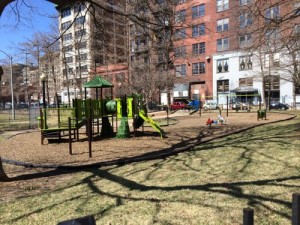Readers: Allowing A 7-9 Year Old Child To Play At A Local Park Is NOT Child Neglect

In the poll last week most readers agreed the two moms arrested the week before shouldn’t have been arrested, letting their kids play in the park wasn’t child neglect. To refresh your memory:
In South Carolina a mom was arrested after allowing her 9-year old daughter to play in the park unsupervised:
She spent 17 days in jail, temporarily lost custody of her girl, thought she lost her job, and still faces 10 years in prison if convicted of felony child neglect. (CBS News)
A very similar case reported in Florida the next day when a mom allowed her 7-year old to play in a park:
Dominic was playing when Port St. Lucie Police pulled up. Police took him home and arrested his mom charging her with child neglect. (source)
Here are the poll results.
Q: Is allowing a 7-9 year old child to play at a local park ‘child neglect’?
No 120 [71.43%]
Maybe 35 [20.83%]
Yes 9 [5.36%]
Unsure/No Opinion 4 [2.38%]
Comments on the post raised valid questions, such the time frame between letting a kid play and neglect; apparently one mom had her kid play in the park while she was at work. I don’t know that we can put at time frame applicable to every kids. I know I was away from home for hours at a time as a child. My concern is those who answered “Yes” and “Maybe” might be too over protective. As kids get older they need the freedom to gain independence.
A Psychology Today post titled Parenting: Raise Independent Children, Are you raising responsible or contingent children? addresses the issue:
One of your most important goals as a parent is to raise children who become independent and self-reliant people. Certainly, in early development, your children count on you. As infants, they rely on you for nourishment, cleaning, and mobility. As your children grow, they become more independent in these basic areas of living, but still depend on you for love, protection, guidance, and support. As your children reach adolescence and move toward adulthood, they become less reliant on you and gain greater independence in all aspects of their lives. This process of separation prepares your children for the demands of adulthood. But this progression toward adulthood is not inevitable and is often stymied by well-intentioned, but misguided, parents.
Contingent Children
Contingent children are dependent on others for how they feel about themselves. Some parents want to foster this dependence. These parents act on their own needs for power and use control and coercion to ensure that they remain the dominant forces in their children’s lives. Contingent children can be recognized in the following ways:
Depend on others to provide them with incentive to achieve.
Depend on others for their happiness because they have no ownership of their lives and little responsibility for their own thoughts, emotions, and actions.
Reinforced with inappropriate rewards and no limits, and regardless of their behavior.
Poor decision makers because their parents hold the belief that they always know what is best and make decisions without soliciting their children’s wishes.Independent Children
Independent children differ from contingent children in several essential ways. If your children are independent, you have provided them with the belief that they are competent and capable of taking care of themselves. You offered them the guidance to find activities that are meaningful and satisfying. You gave your children the freedom to experience life fully and learn its many important lessons. Independent children can be recognized in the following ways:
Intrinsically motivated because they are allowed to find their own reasons to achieve.
Were given the opportunity and guidance to explore achievement activities of their own choosing.
Parents use extrinsic rewards appropriately and sparingly.
Collaborative rather than a controlled relationship with their parents in which the children’s ideas and wishes are solicited and considered.
Good decision makers because they were allowed to consider various options and, with the support and guidance of their parents, make their own decisions.
The world is no worse than it was 20-30-40 years ago, we just have more news outlets with time to fill. Keep your kids safe, but please make sure they learn how to become independent.
— Steve Patterson
I wonder how many of those people have kids? I take any advice about parenting and raising kids with a grain of salt…especially from those without children.
“My concern is those who answered “Yes” and “Maybe” might be too over protective. As kids get older they need the freedom to gain independence”. 7-9 years old is very young to be left alone. Believe me, as I sit here with boys this age…they would definitely not be okay being left alone for an extended period of time (over 30 minutes). Over protective? Again, do you have kids? It’s not always as simple as the child’s age, it is about the environment you’re leaving them in, the people around, the neighborhood, the emotional age of the child, the skills they have.
Also, the article quoted above? Independence in thinking, standing up for yourself, achieving goals, exploring. Those are not at all the same as being left alone! Most pediatricians, nurses, teachers, and others who work with kids daily, recommend kids should not be at home by themselves for any amount of time until they are older (I typically see 10+ as the recommendation).
Just re-read this and I don’t want to come across as I don’t respect your opinion. I do. It’s just exhausting as a parent to constantly hear what’s right and wrong (and with most people’s opinion it’s black and white, I just don’t think it’s that clear).